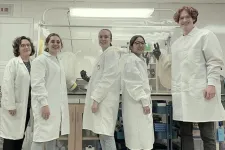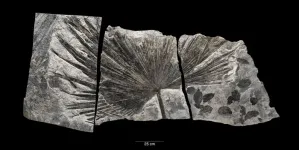(Press-News.org) Researchers discovered a drug that safely and effectively helped cancer patients when they suffered from cachexia (ku-KEK-see-uh), a common condition related to cancer that involves weight loss and muscle wasting.
The results of the randomized phase 2 clinical trial, which included187 individuals who experienced cachexia with lung, pancreatic, or colorectal cancer, were reported in the New England Journal of Medicine on Sept. 14, 2024. Richard Dunne, MD, MS, a Wilmot Cancer Institute oncologist and cachexia expert was part of the large group of investigators who ran the nationwide clinical trial.
Cachexia involves loss of appetite and weight, muscle-wasting, fatigue, and weakness. It affects more than 50 percent of people who have cancer, and currently there are no FDA-approved treatments.
Scientists discovered that a drug, ponsegromab, blocks a hormone known as GDF-15 that regulates appetite and body weight. The patients in the trial had elevated levels of GDF-15, a primary driver of cachexia. Ponsegromab is a type of drug known as a monoclonal antibody, and in this trial, it improved many aspects of cachexia and its symptoms. Side effects were minimal, Dunne said, and in fact ponsegromab appeared to be safer than common appetite stimulants used by cachexia patients.
Drugmaker Pfizer supported the study, and released this news.
“This is super exciting,” said Dunne, an associate professor of Medicine at the University of Rochester Medical Center. “This study is an important step in providing treatment for the hundreds of thousands of patients who suffer from poor quality of life due to cachexia.”
Several academic medical centers participated in the clinical research, which was led by John D. Groarke, MB, BCh, MPH, at Pfizer. Investigators are continuing to study GDF-15 and the importance of the biomarker in several types of cancer. Other clinical trials are also testing additional cachexia treatments that do not target the GDF-15 pathway.
Learn how Wilmot is involved in the global effort to understand and prevent cancer cachexia.
END
New cancer cachexia treatment boosts weight gain and patient activity
2024-09-19
ELSE PRESS RELEASES FROM THIS DATE:
Rensselaer researcher receives $3 million grant to explore gut health
2024-09-19
Blanca Barquera's investigation into the energy-generating processes of Bacteroides, the most abundant member of the gut microbiome, and their impact on our well-being holds the promise of significant advancements in human health. Barquera is a professor at Rensselaer Polytechnic Institute in the Departments of Biological Sciences and Chemistry and Chemical Biology.
In recent years, it has become increasingly clear that an unhealthy gut is more than just a source of digestive troubles. A healthy ...
Elam named as a Fellow of the Electrochemical Society
2024-09-19
Jeffrey Elam, senior chemist, Distinguished Fellow, and founder of the atomic layer deposition (ALD) research program at the U.S. Department of Energy’s Argonne National Laboratory, was named as a fellow of the Electrochemical Society (ECS), which focuses on advancing theory and practice at the forefront of electrochemical and solid-state science and technology. Elam, who has been with the lab since 2002, has been a trailblazer in thin film coating science and technology for over 20 years, ...
Study reveals gaps in access to long-term contraceptive supplies
2024-09-19
Oregon Health & Science University researchers have found that despite legislation in 19 states requiring insurers to cover a 12-month supply of contraception, patients aren’t receiving a year’s worth of their prescription; most receive just three months or less.
Their study recently published in the journal JAMA Health Forum shows that policies requiring coverage of a 12-month supply of short-acting hormonal contraception — most commonly the birth control pill — have not been fully implemented, resulting in no substantial increases nationally in year-long prescription orders. This leaves many patients at an increased risk for unintended ...
Shining a light on the roots of plant “intelligence”
2024-09-19
All living organisms emit a low level of light radiation, but the origin and function of these 'biophotons' are not yet fully understood. An international team of physicists, funded by the Foundational Questions Institute, FQxI, has proposed a new approach for investigating this phenomenon based on statistical analyses of this emission. Their aim is to test whether biophotons can play a role in the transport of information within and between living organisms, and whether monitoring biophotons could contribute to the development of medical techniques for the early diagnosis of various diseases. Their analyses of the measurements of the faint glow emitted by lentil ...
Scientists identify a unique combination of bacterial strains that could treat antibiotic-resistant gut infections
2024-09-19
Antibiotic-resistant bacterial infections often occur in patients with chronic inflammatory intestinal conditions, such as inflammatory bowel disease, and in patients who have taken antibiotics for a long time. Gram-negative bacteria such as Enterobacteriaceae are a common cause of these infections and have few treatment options. Fecal microbiota transplants have shown promise to curb some of these infections, but their composition varies between batches and they aren’t always successful.
Researchers at Keio University School of Medicine in Tokyo and the Broad Institute of MIT and Harvard have isolated ...
Pushing kidney-stone fragments reduces stones’ recurrence
2024-09-19
Sometimes all it takes is a little push.
That is the conclusion of a recently published study in which doctors used a handheld ultrasound device to nudge patients’ kidney-stone fragments.
As many as 50% of patients who have kidney stones removed surgically still have small fragments remaining in the kidneys afterward. Of those patients, about 25% find themselves returning for another operation within five years to remove the now-larger fragments.
UW Medicine researchers found, however, that patients ...
Sweet success: genomic insights into the wax apple's flavor and fertility
2024-09-19
A recent study has successfully decoded the autotetraploid genome of the wax apple, uncovering its genetic evolution and key factors driving fruit diversity. The research highlights the fruit’s rich antioxidant profile, with promising implications for human health and breeding strategies aimed at enhancing nutritional value.
Wax apple (Syzygium samarangense), known for its crisp texture, rose-like aroma, and health benefits, faces breeding challenges due to its complex genetic diversity and limited genomic data. These obstacles have hindered efforts to improve key fruit qualities such as size and sugar ...
New study charts how Earth’s global temperature has drastically changed over the past 485 million years, driven by carbon dioxide
2024-09-19
A new study co-led by the Smithsonian and the University of Arizona offers the most detailed glimpse yet of how Earth’s surface temperature has changed over the past 485 million years. In a paper published today, Sept. 19, in the journal Science, a team of researchers, including paleobiologists Scott Wing and Brian Huber from the Smithsonian’s National Museum of Natural History, produce a curve of global mean surface temperature (GMST) across deep time—the Earth’s ancient past stretching over many millions of years. ...
Scientists say we have enough evidence to agree global action on microplastics
2024-09-19
Science has provided more than sufficient evidence to inform a collective and global approach to tackle the continued spread of plastic pollution, according to a new report.
Writing in the journal Science, an international group of experts say the need for worldwide action to tackle all forms of plastic and microplastic debris has never been more pressing.
It is clear that existing national legislation alone is insufficient to address the challenge, they say, and the United Nations’ Plastic Pollution Treaty ...
485 million-year temperature record of Earth reveals Phanerozoic climate variability
2024-09-19
Estimating past global temperature is important for understanding the history of life on Earth and for predicting future climate. Now, a new reconstruction of Earth’s temperature history over the past 485 million years – based on a method that combines diverse physical proxy data with climate model predictions – reveals a much wider range of climate variability across the Phanerozoic eon than previously understood. The findings highlight atmospheric carbon dioxide (CO2) as the dominant factor controlling climate variability throughout this period, offering new ...



